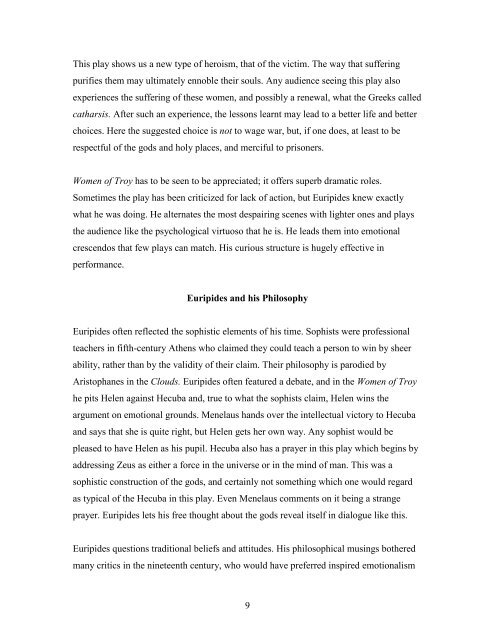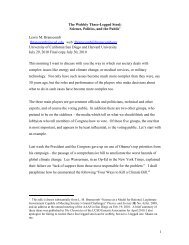1 EURIPIDES' TROJAN WOMEN PREFACE, TRANSLATION, and ...
1 EURIPIDES' TROJAN WOMEN PREFACE, TRANSLATION, and ...
1 EURIPIDES' TROJAN WOMEN PREFACE, TRANSLATION, and ...
You also want an ePaper? Increase the reach of your titles
YUMPU automatically turns print PDFs into web optimized ePapers that Google loves.
This play shows us a new type of heroism, that of the victim. The way that suffering<br />
purifies them may ultimately ennoble their souls. Any audience seeing this play also<br />
experiences the suffering of these women, <strong>and</strong> possibly a renewal, what the Greeks called<br />
catharsis. After such an experience, the lessons learnt may lead to a better life <strong>and</strong> better<br />
choices. Here the suggested choice is not to wage war, but, if one does, at least to be<br />
respectful of the gods <strong>and</strong> holy places, <strong>and</strong> merciful to prisoners.<br />
Women of Troy has to be seen to be appreciated; it offers superb dramatic roles.<br />
Sometimes the play has been criticized for lack of action, but Euripides knew exactly<br />
what he was doing. He alternates the most despairing scenes with lighter ones <strong>and</strong> plays<br />
the audience like the psychological virtuoso that he is. He leads them into emotional<br />
crescendos that few plays can match. His curious structure is hugely effective in<br />
performance.<br />
Euripides <strong>and</strong> his Philosophy<br />
Euripides often reflected the sophistic elements of his time. Sophists were professional<br />
teachers in fifth-century Athens who claimed they could teach a person to win by sheer<br />
ability, rather than by the validity of their claim. Their philosophy is parodied by<br />
Aristophanes in the Clouds. Euripides often featured a debate, <strong>and</strong> in the Women of Troy<br />
he pits Helen against Hecuba <strong>and</strong>, true to what the sophists claim, Helen wins the<br />
argument on emotional grounds. Menelaus h<strong>and</strong>s over the intellectual victory to Hecuba<br />
<strong>and</strong> says that she is quite right, but Helen gets her own way. Any sophist would be<br />
pleased to have Helen as his pupil. Hecuba also has a prayer in this play which begins by<br />
addressing Zeus as either a force in the universe or in the mind of man. This was a<br />
sophistic construction of the gods, <strong>and</strong> certainly not something which one would regard<br />
as typical of the Hecuba in this play. Even Menelaus comments on it being a strange<br />
prayer. Euripides lets his free thought about the gods reveal itself in dialogue like this.<br />
Euripides questions traditional beliefs <strong>and</strong> attitudes. His philosophical musings bothered<br />
many critics in the nineteenth century, who would have preferred inspired emotionalism<br />
9









